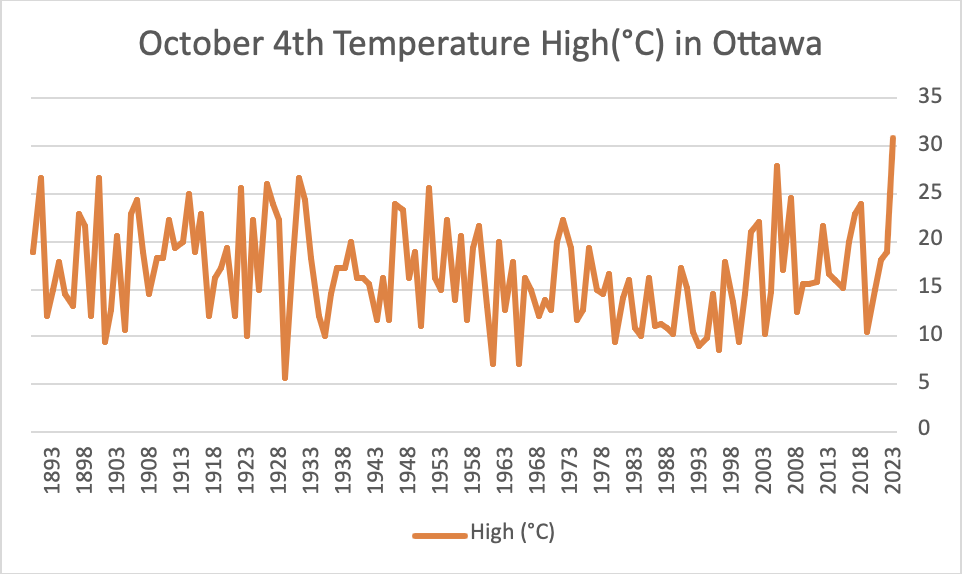After a summer of high temperatures and wildfire smoke, Ottawa continued to feel the effects of climate change as a heat wave broke temperature records in early October.
Residents should be preparing for more extreme weather moving forward, says Scott Mitchell, a Carleton University professor and extreme weather expert.
“The frequency of this weirder weather … things that really jump out as not normal conditions, is going to go up. Exactly what’s going to happen, that’s reading tea leaves, but the frequency is what we’re going to have to get used to,” said Mitchell.
“So we’re going to have to make sure that our safety standards, our building standards, everything, are up to more variability, even if we’re not sure exactly which kinds of extreme weather events are going to hit in a particular place.”
Thanksgiving brought more seasonal temperatures, but, for example, Oct. 4, 2023 was the hottest Oct. 4 in Ottawa’s recorded history, beating out every year since 1890, with temperatures of up to 30.9° celsius.
Andrea Flowers, the manager of strategic projects at the City of Ottawa, says the heat wave is not a one time event. “Extreme heat and heat-related illnesses are one of the top climate risks for our city, and Ottawa’s climate is already getting warmer,” Flowers said in an email interview. “The number of days above 30 degrees Celsius is expected to increase by four times to 43 days per year by the 2050s.”

Climate change has caused temperatures around the world to fluctuate, with above-average levels of extreme weather conditions.
In January 2020, the City of Ottawa approved a Climate Change Master Plan, which outlines actions for the city to take to combat climate change over the next 30 years.
“Ottawa’s Climate Change Master Plan is the City’s overarching framework to reduce greenhouse gas emissions and respond to the current and future effects of climate change,” Flowers said.
The plan outlines eight priorities, including a climate vulnerability assessment, developing a governance framework and encouraging private action. A progress report released in April revealed that five of those eight priorities were not yet on track, with seven in development and one not started. Explorations of a potential “carbon budget” to limit greenhouse gas emissions and green infrastructure are among the priorities that have fallen behind schedule.
Alta Vista Coun. Marty Carr, a member of the Environment and Climate Change Committee, says the delay, “largely is due to limited staff resources as well as further consultation and analysis required due to the scope of the priorities. Staff continue to work diligently on these priorities.”
Of the eight city priorities, two are moving along. The first is the application of a climate lens to asset management and capital projects, and the second is encouraging private action.
In general, Mitchell, who has attended a few meetings about the master plan, says he approves of what he has seen. “On the presentations that I could actually attend, I saw that there is pretty good progress made on some individual portions … but also their projections, the things that they’re doing now that are going to lead to a more efficient city through time, that looked really good.”
Initiatives are taking place throughout Ottawa to reduce the effect of climate change on residents. For example, Ottawa Public Health provides resources for dealing with heat-related illnesses, including a map of places to cool off around the city.
“We know that we’re going to get a lot more extreme heat days and that the summer season is going to expand, as will the colder seasons, and so recognizing that there are a lot of adaptations that we need to think of doing … those are being explored.”
Birgit Isernhagen, environmental policy lead for Ottawa Public Health
Birgit Isernhagen, the environmental policy lead for Ottawa Public Health, says the organization is taking action to help citizens better protect themselves in the face of a changing climate.
“We know that we’re going to get a lot more extreme heat days and that the summer season is going to expand, as will the colder seasons, and so recognizing that there are a lot of adaptations that we need to think of doing … those are being explored,” said Isernhagen.
Isernhagen emphasized that, while heat-related illnesses are a significant issue, they are also preventable. “There are simple ways to cool off, even without air conditioning, and that’s putting your hands and feet in cold water or taking cold showers over and over to cool off your body.”
Mitchell recommended that Ottawa residents with an interest in the climate try to reduce their carbon footprint. “Think in terms of, when you have alternatives, what could be a lower carbon choice,” he said.
He recommends electric vehicles, eco-conscious technology and transportation such as e-scooters when possible, but also noted the issue of affordability that factors into climate-conscious purposes.
Flowers provided a list of ways that Ottawa residents can take action on climate change, which included Ottawa.ca resources for Reducing your greenhouse gas emissions, Home energy efficiency, Transportation, Waste and recycling, Preparing for a changing climate, community suggestions and a climate change e-newsletter.
And, Carr said, “It is important to be prepared for an emergency and to look at taking preventative measures to protect yourself and your property from natural disasters.”




